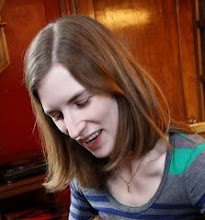A Perfect Thing

Right now, I’m reading The Wonder Spot, the latest novel by Melissa Bank (who also wrote The Girls’ Guide to Hunting and Fishing). I’m not even halfway through, but I am thoroughly enjoying the experience thus far. (I use the word “experience” because that’s just what it is. I think a poor to mediocre book is simply a “read”; a good book can be an “experience”; a great book an “illumination”.)
I love when a book can spur my imagination and make me think beyond the boundaries of the story. My current takeaway from this book is the concept of a perfect thing. One of the characters in this book, a young woman named Venice, is described:
“Venice Lambourne was famous the way a beautiful girl can be in a small circle of places and parties, but hardly anyone knew her. 'Knock-out' was the word people used to describe Venice, and 'bombshell' … She was very thin and very tall—-five foot ten in flat shoes. She almost always wore flats, one pair until they wore out, and then she’d get another. She didn’t have many things—-not many clothes or many possessions, either; she believed in owning only perfect things, or, as she said, ‘one perfect thing.’”
As a minimalist ideal, I love this concept. (Minimalism is something I’ve tinkered with since living in Pennsylvania, where I knew a woman who had many things but always talked about having few things: together, she and I devised the “single carload” theory to possessions, that we should only own as much as could fit in one car, although neither of us ever had any less than a U-Haul’s worth of possessions.) If you're striving to own only things that are perfect--the perfect pants, the perfect perfume, the perfect bed sheets--you're bound to have fewer possessions than if you are willing to settle for mediocre.
The roommate with whom I lived for more than two years (she just moved away in August) had a theory close to the "perfect thing". She and I used to do fashion shows for each other. If we were going out, or one of us was planning for an event (wedding, concert, whatever), we'd try on various outfits for each other, share opinions, and make fashion decisions. It was a way of connecting that went beyond fashion, but that is another story. The point of this story is what my roommate said one day when I was trying on dresses, trying to decide what to bring for my "fancy outfit" on vacation--"Does it make you feel pretty, Erin?" she asked. Then she went on to explain that she'd decided some months ago that when she bought new clothes, she would only buy things that made her feel pretty and confident. "What's the point in owning anything else?" she said.
While I understand and can appreciate the ideal of a perfect thing, I think a pursuit for perfection, particularly one that goes beyond clothing and possesions, can be dangerous. In Bank's story, the young woman Venice, presumably caught up in her search for only perfect things, ends up giving up a relationship in her life for a different one that appears to be more perfect, on the surface. In reality, it is far from perfection.
She's described getting ready to go out early on in the book:
"It took her about thirty seconds to get ready. She didn't change her clothes--a robin's-egg-blue boatneck, white capris, and black flats, each a perfect thing--and didn't wear makeup, herself a perfect thing. All she did was wash her face."
When she begins her new relationship, she's described wearing make-up, dressing differently. She has traded her natural "perfection", her own true self, trying to fit into someone else's ideal of perfection. The result is unhappiness--she seems nervous, on edge, and the relationship eventually ends.
I think when it comes to interpersonal relations--friendships, relationships--striving for perfection can be a very dangerous thing. Perhaps a pair of ballet flats can be perfect, but no person can be absolutely perfect. In fact, it is the imperfections that make each person different and interesting. (This goes for real life, and I think for characters in stories, as well. How interesting would a story be in which everyone was perfect?)
I remember one day when I was a child--in elementary school--my family and I were going to have a family picture taken. We were all dressed up, and my mother had done my hair especially for the day. My mom told me how pretty I looked, and I felt sick to the stomach. I went to look in the bathroom mirror, and I was shocked at my own reflection. I started to cry. I didn't recognize the girl who was looking back at me, and I didn't want to know her. I didn't want to be pretty. I didn't want the attention I thought being pretty would bring to me. I didn't want to be any different than I was every other day. I remember a feeling of frustration and anger, although I've never been able to pinpoint exactly what caused it. Maybe it was just me feeling uncomfortable with what felt like a false perfection. Maybe it was me taking a stand for my true self--full of imperfections and a beauty that had nothing to do with how I looked.
I think one of the most interesting things a writer can do with the idea of a perfect thing is try to find and portray that spark of perfection within an imperfect situation or character.
I'll strive to do this in my stories!




